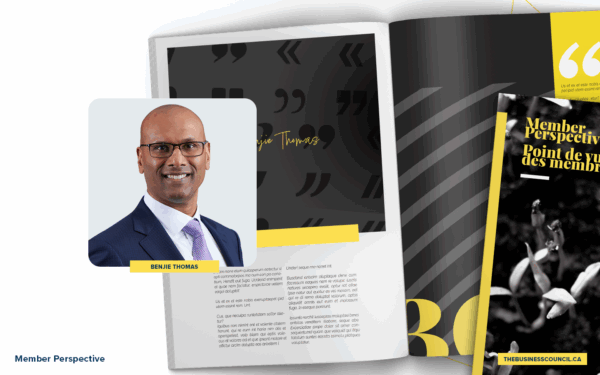On a mission to bring more women into the logistics industry
Earlier this month, in celebration of International Women’s Day, I wrote about a few of the extraordinary women who inspire me and who are unsung heroes of the pandemic, in my eyes. Two of those women I called out are FedEx Express Canada team members. They’re among the people who have been crucial to delivering an essential service to Canadians across the country, keeping people and businesses connected in extraordinarily disruptive times.
I feel fortunate to count many talented, industrious women among our team at FedEx, including many long-time employees. Women are a driving force behind our success as a business.
That’s why I was disheartened to see that more women aren’t considering logistics as a place to build a career. We recently launched the first-ever FedEx Express Canada Women in Transportation and Logistics survey to get a sense of how women see our industry. Just under half (48 per cent) of those we surveyed said they’re not interested in a career in the transportation and logistics industry, and less than one in 10 said they considered the industry “an appealing career choice.”
I’ve spent my career in logistics and I’ve found it tremendously rewarding. It’s an opportunity to constantly learn and challenge yourself, but beyond that, it’s an industry that can fill you with a sense of purpose. Especially in today’s ever-digital world, our ability to connect people and businesses is critical. We help keep the economy running and, in many cases, deliver joy to people in moments they need it most. At FedEx, we are guided by a promise to make every experience people have with FedEx outstanding and there is no greater feeling for our employees than owning and executing on that promise.
As an optimist, I would be remiss to not acknowledge that 52 per cent are interested in this field, which is a positive sign for our growing industry. However, these results are a clear signal to me that the industry has more work to do to recruit women into rewarding, meaningful career opportunities. Not only does this have benefits for our society and strengthening our economy, but it’s also just the right business decision. Research continues to show that diversity, including gender parity, has tangible business results. Companies with more women in leadership roles, for example, financially outperform their competitors. I believe Canada’s transportation and logistics sector will be better positioned for success when those in the industry reflect the diversity of the community in which we serve every day.
Why aren’t more women considering transportation and logistics?
The transportation and logistics industry is undoubtedly still male dominated. Currently, women make up just under 23 per cent of the industry, so we have a long way to go to create more balance. However, to my surprise, perceptions about the industry being male dominated aren’t what’s keeping most women from considering a career at companies like ours. Just 14 per cent of the women we surveyed who have not considered a career in the industry listed this as a barrier to entry.
So, what is stopping women from considering logistics?
For 57 per cent of women surveyed who are open to a career in transportation, the prospects of shiftwork are a barrier, while 46 per cent cite physical demands. While those concerns are valid, it’s also worth noting that the logistics industry may be suffering from outdated notions of what our jobs look like. The movement of people and goods is among the largest contributors to the Canadian economy and is a critical facet of some of the fastest growing pillars in commerce today. International trade, healthcare, e-commerce, innovation and other exciting fields all rely on a healthy and vibrant transportation and logistics sector.
Moreover, out of the women surveyed who have not considered a career in transportation, just over half said the industry doesn’t reflect their interests, but about the same percentage said they simply don’t have enough knowledge about the logistics industry to know if there are professional opportunities that might interest them. And finally, a stat that really hit close to my heart was that almost a quarter of women who said they were open to a career in the logistics/transportation industry cited a lack of female role models as a dissuading factor.
To me, these are a huge miss on our part as leaders in the industry. We need to do a better job of educating women about what working in this field really looks like in terms of types of roles available and the number of women already in our workforce, including senior roles that are mission-critical to our day-to-day operations.
We have what women want – so let’s talk about it
When asked what women consider most when exploring a new career opportunity, the majority ranked job satisfaction, and compensation and benefits among the top aspects driving their decision making. Stability and the opportunity to advance also ranked high on the list.
To me, the logistics industry offers all these things – we just need to talk about it more.
When I started at FedEx Express Canada, the number of women in senior roles were few and far-between which is why I’m extremely proud that today, I’m able to look around the (virtual) table and see how many women are now among our leadership teams. With 50% of executive roles filled by women, I’m confident we’re raising the bar for the next generation of FedEx female leaders – and the industry in general.
Further, for women who are looking for stability, our industry has grown throughout the pandemic. I found it encouraging that 33 per cent of women who are open to a career in logistics said they perceive logistics to be a stable industry due to continued growth in shipping needs. FedEx Express Canada has increased its employee base from 7,500 employees to almost 12,000 in the span of the last eight months. E-commerce fueled by the pandemic is driving this extraordinary growth. While I will not share our volume levels here in Canada, I can put this growth into perspective by looking at trends south of the border. Pre-COVID, FedEx projected that the U.S. domestic market would hit 100 million packages per day by calendar year 2026. The market is now expected to hit this mark three years sooner, by 2023. As much as 96% of this growth is expected to come from e-commerce and we expect a similar trend to take place in Canada . Further, we have taken on important new challenges such as the distribution of PPE, COVID-19 vaccines, and a pledge to be carbon neutral by 2040. This means even more innovation and positive transformation for FedEx and our industry. As that happens, more career opportunities will emerge, and women will be essential for continuing our momentum.
The more women we can get into the workforce, the stronger our society will be, especially in the post-pandemic recovery. At FedEx, we have worked hard to build a culture that rewards merit, invests in career development, and values inclusion throughout the organization. In fact, we’re thrilled that Great Place to Work Canada has recognized FedEx Express Canada as one of the Best Workplaces™ for Women in 2021.
Ultimately, we want our business to reflect the communities we serve and fuel the Canadian economy and we simply cannot do that without more women at the table.
These findings are fueling my mission to recruit more women into our industry, and I hope my peers – women and men – in transportation and logistics will follow. It’s up to all of us in this essential industry to get career opportunities on more women’s radars. When we do, we will all benefit.









